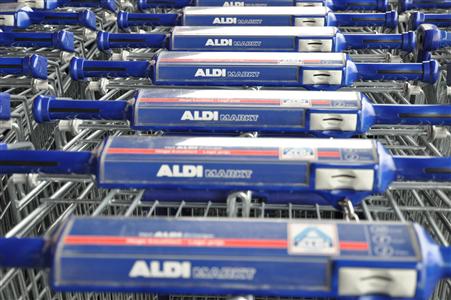AMSTERDAM (EJP) — Dutch media reports revealed two of the country’s largest supermarket chains had moved to boycott Israeli settlement produce Monday, as Aldi and Hoogvliet removed all identifiable settlement produce from sale, as well as other Israeli-made goods until their source can be verified.
According to Dutch daily Trouw, an official statement by Aldi, a discount supermarket company based in Germany, claimed the act was a deliberate attempt to distance itself from “public discourse” on the contentious issue in light of last week’s new EU directives instructing member states to evade the effective funding of Israeli businesses operating within disputed post-1967 territories.
EU foreign policy chief Catherine Ashton clarified the guidelines were a pre-emptive measure ahead of the January 2014 deadline for all 28 member states to legislate on this in line with the EU’s “long-held position that bilateral agreements with Israel of not cover the territory that came under Israel’s administration in June 1967”. Alignment with these directives would signal an effective boycott of all produce sourced from the West Bank, East Jerusalem and the Golan Heights.
The Israeli foreign ministry responded by accusing the EU of attempting “to coerce positions on issues which belong at the Israeli-Palestinian negotiating table”. “Israel’s borders will not be determined by European Commission guidelines but by negotiations between the concerned parties,” concluded the official comment.
A third retailer Jumbo already has a settlement produce boycott in place, and has requested its suppliers to avoid sourcing products destined for the chain from “occupied territory”. Other retailers are likely to follow suit pending the result of a ruling the Central Food Retail, the country’s umbrella supermarket association.
The lack of clarity on the issue stems from the government itself, however, after a directive from the Dutch Economic Affairs Ministry advising stores to re-label Israeli-made produce to reflect their settlement roots was hastily removed from the department’s website, awaiting an official ruling by the European Commission. Ahead of the retraction, Dutch Foreign Minister Frans Timmermans sought to justify the government guidelines by telling parliament the move would not represent any action against Israel as according to international law, settlements are not considered a part of Israel’s legitimate borders. He further maintained the directive did not call for a ban of settlement produce, rather more specific labelling and was designed to avoid “contributing to the economy of illegal settlements”.
Close Israeli ally Holland is a known proponent of increased trade with the Jewish State, agreeing to form a bilateral Dutch-Israeli Cooperation Forum only last month, to span the fields of energy and technology. Confirming the agreement, Israeli Premier Benjamin Netanyahu said it was aimed at ”increasing cooperation in the field of innovation and by bringing together representatives from the business sectore, academia, civil society and the government, and to explore new fields of possible cooperation” with Holland.
The first meeting of the new forum will be held in Israel at the end of this year by the Prime Ministers of Israel and Holland, in the company of other high-profile government ministers, following which meetings will be held every other year in each country.
The latest upgrade in bilateral relations between the Jewish State and the Netherlands follows the establishment of a scheme promoting a mutual trading relationship between the allies last June, during a visit by Dutch Vice Prime Minister and Minister of Economic Affairs Maxime Verhagen to Israel, at the head of a delegation of 60 Dutch business representatives.
The Netherlands is by no means the first EU member state to move to reassess its position on labelling settlement produce, after the British government likewise issued a recommendation and Denmark last year advocated a ban on labelling settlement produce as a product of Israel. Despite look into the matter, however, the Danish government has yet to take concrete action on pursuing a ban.
Holland has also consistently supported Israel in international forums, such as UNESCO, where it opposed the admission of Palestine, and the UN General Assembly, and often speaks in Israel’s defence in internal EU meetings. The Netherlands delegation voted to abstain from last November’s vote on Palestinian Authority non-member observer status at the UN General Assembly, along with fellow Israeli allies Germany, the UK, Bulgaria and Poland.
The Netherlands was also thought to have been influential in securing a consensus to designate the military wing of Lebanese militant group Hezbollah a terrorist organisation at Monday’s EU foreign affairs council, a year after the Burgas bombings claimed the lives of six Israelis in terrorist attack, the responsibility for which Bulgarian authorities have since attributed to the close Iranian allies. Holland already considers both military and political wings of the organisation as a terrorist entity.
Meanwhile, Israeli daily Ha’aretz revealed Tuesday it had obtained a copy of a letter sent to EU Commission head Jose Manuel Barroso and other senior EU officials by Ashton earlier this month, calling for more concrete proposals on settlement product labelling to be put in place by the end of the year.
According to the reports, the memo, issued to the commissioners responsible for justice, industry, consumer protection, agriculture, taxation, trade and internal market, makes the case for “nonbinding” guidelines to be issued as a move “toward ensuring the effective implementation of existing EU legislation relevant for the correct labelling of settlement products by adopting EU guidelines and other implementing acts where necessary”.
“An overwhelming majority of Member States have recently supported or openly demanded the preparation of EU-wide guidelines on this issue in order to implement EU law in a coherent manner,” she wrote.


